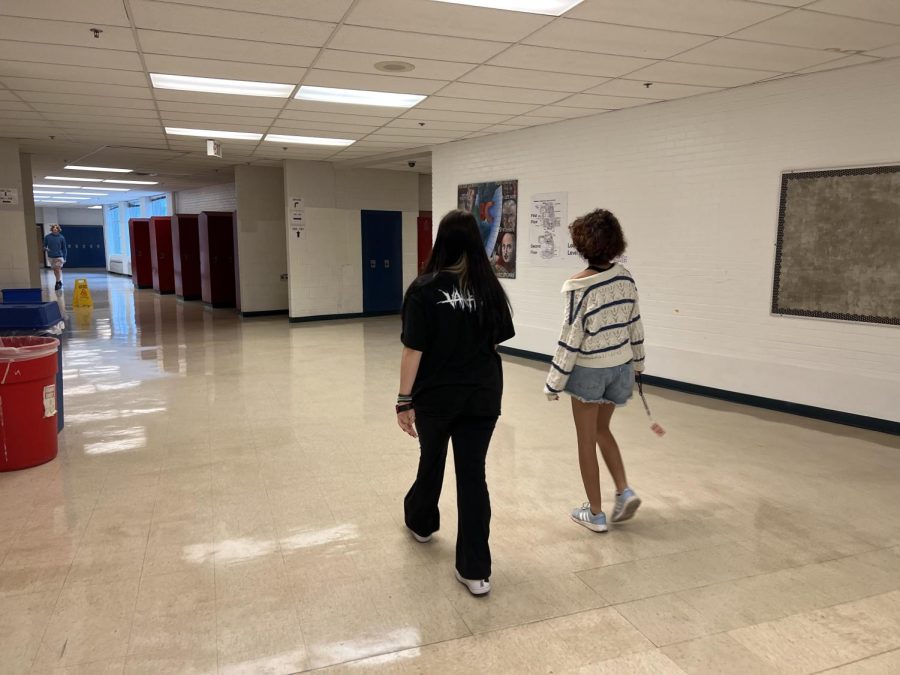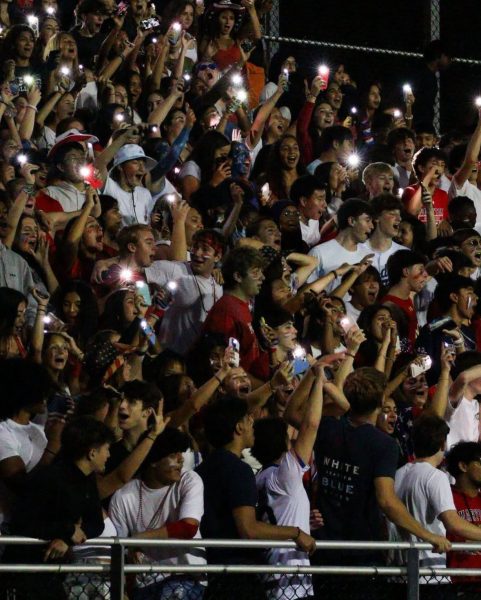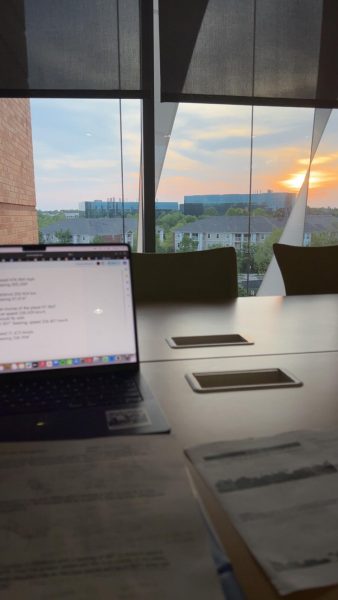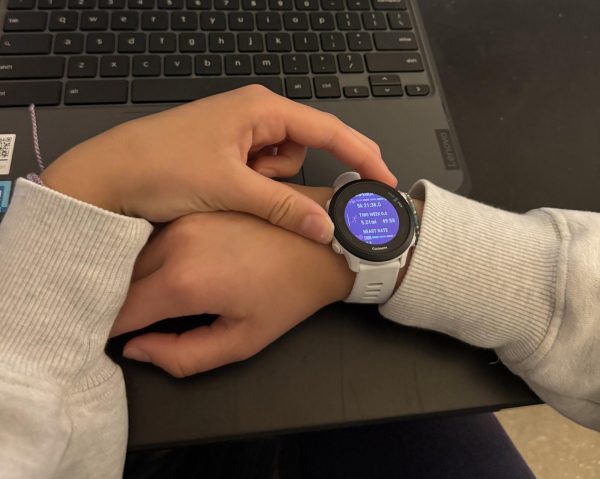Principal Nelson dives in to new policies; students have mixed opinions
Seniors Haven Golliday and Addy Ziafat walk back to class with new hall passes.
Over the summer, the school underwent dramatic changes on the administrational level with the appointment of Douglas Nelson as principal and the policy changes that followed. On the first day of school, students were welcomed back and briefed on the policy changes that would take place this year, including the new Personal Mobile Device (PMD) policy, hall pass system and returning lunch prices in the cafeteria.
On Aug. 18, Nelson shared an email to students detailing the new PMD policy. The policy directs students to keep their personal mobile devices, such as phones and bluetooth headphones, “out of sight” from the beginning of class. When a device is observed in class, the policy directs teachers to first warn students, and if the issue persists, request that the device is put away, call home, confiscate the device and finally refer the student to an administrator.
In addition to the PMD policy, a new hall pass system was implemented on the first day of school. Each classroom contains two color-coded hall passes, with each color corresponding to a section of the building. Students are advised not to leave class within the first and last 10 minutes of each period, and only two students from a class may leave with a hall pass at any given time.
These new policies garnered mixed reactions from students, and many were under the impression that they had come straight from Principal Nelson. During the first week of school, students varied in their initial impressions of Nelson and the new policies. Senior Joyce Yang said, “The policies feel a bit excessive.”
Senior Margarita Williams agreed. “I don’t think there was anything wrong with the way it was before. The students who are truly focused in school just keep their phones away. I think the policing is unnecessary,” she said.
Senior Jade Frenche said, “it sucks, I get not being able to have our phones out during teacher instruction, but when I use my phone after I’m finished with work it’s still an issue and I’m a Senior.”
Others understood the new policies. Sophomore Vera Shcherbakova said, “I think [the PMD policy] is reasonable and students should respect it. Phones really can be a distraction during class and it shouldn’t be an issue to put them away for 45 minutes.”
Nelson clarified that these policies did not come straight from him, although he understands why it might seem that way to students. “I got to give voice to the PMD policy. I shared the email, I did all of that, which gave the impression that it may have come from Mr. Nelson’s desk, but that’s not the fact. The policy is actually the work of Wootton’s Instructional Leadership Team (ILT)… the administration simply rolled it out,” Nelson said.
Every school in MCPS has an Instructional Leadership Team. The team is made up of leaders in the building, from administrators to department heads, like the head of counseling and the head of social studies, a staff development teacher and a restorative justice coach that each represent different stakeholders in the building.
Nelson said the purpose of an ILT in the building is multi-fold. “We bring all of these different leaders together on the ILT because they are the deciding body for the building. I think oftentimes, schools create the perception that it’s simply administrators, or let’s say, a department head, and it’s just kind of like we make a decision, we put it out there… Many times, in fact, it’s the ILT that has worked on that, and then administrators are just sharing that information. So they make all the big decisions for a school,” Nelson said.
Nelson said that these decisions stemmed from survey data from students and staff at the end of last year. “At the end of the school year, there was clearly a pretty extensive survey that was rolled out to both of these groups with very specific questions. The survey data was analyzed at ILT for an extensive period of time, and then because there were trends, ideas floated to the top. One was that students were in the hallway without a really valid reason, and the other was that students were distracted in class because of technology use, and they weren’t really listening to the ask to put it away. So, that is where those policies came from. They came from a need, and then ILT really developed them,” he said.
Nelson said he understands why students have criticized the new PMD and hall pass policies as being excessive or intrusive. “First of all, I would hear the concern. I felt it too as we were developing it. So, I would put myself in students’ shoes and, you know, how do I feel when I’m sitting on an airplane and all of a sudden a flight attendant tells me I have to put away my device? I get told that too. I think we all feel it, I know we don’t necessarily always love it. But then, oftentimes we follow through with what we’re asked to do,” he said. “I hope the positive effect is more learning and that students can see that it is OK to put that device down. I do believe that, as much as the learning is great, I think that when students give their attention fully to either learning from the teacher or interacting in groups, it’s a way that you show individuals that you care about them.”
He explained, also, that these policies were a part of a strong instructional focus the ILT has this year. The focus, that Nelson said students will soon start to experience, is called No Secrets Classroom. “The idea here” he said, “is that oftentimes, teachers simply roll out the approach.We assign a paper, we give you a rubric, students get started with their writing. There’s a math test, you get a study guide, you take the test. There’s a project in social studies, you develop it, your teacher scores it and returns it to you. But there’s a place in all of that for students’ voices. We, as teachers and staff, should listen to our students. You are equal to us in this system of learning that’s created in school. So, we’re starting to explore how to really bring the student voice into the classroom, and that is exciting to me as a practitioner and someone who has a genuine interest in instruction and how we do it.”
It seems that as the quarter goes on students are adapting to the new policies. Senior Haven Golliday said that initially, she thought the policies were unnecessary and unimportant, but on week three, she said, “If I’m being honest, the phone policy has definitely helped me pay attention and increased my awareness of what’s going on in class. The hall pass policy hasn’t really affected me, but it makes sense. It’s there so we know where people are supposed to be and I think it would keep people safe in case of an intruder.”
Your donation will support the student journalists of Thomas S. Wootton High School. Your contribution will allow us to purchase equipment and cover our annual website hosting costs.
Senior Isaac Muffett is the opinions editor in his fourth year on the Common Sense staff. When he's not writing or researching, he spends his free time...







